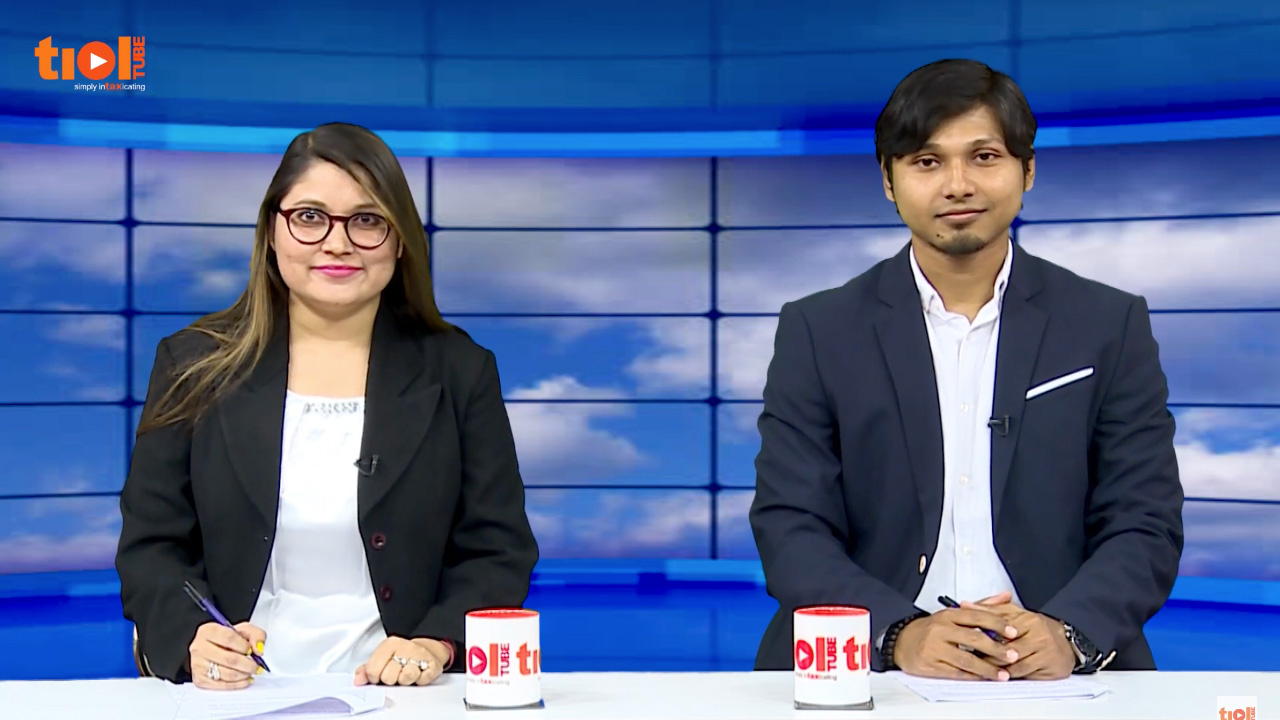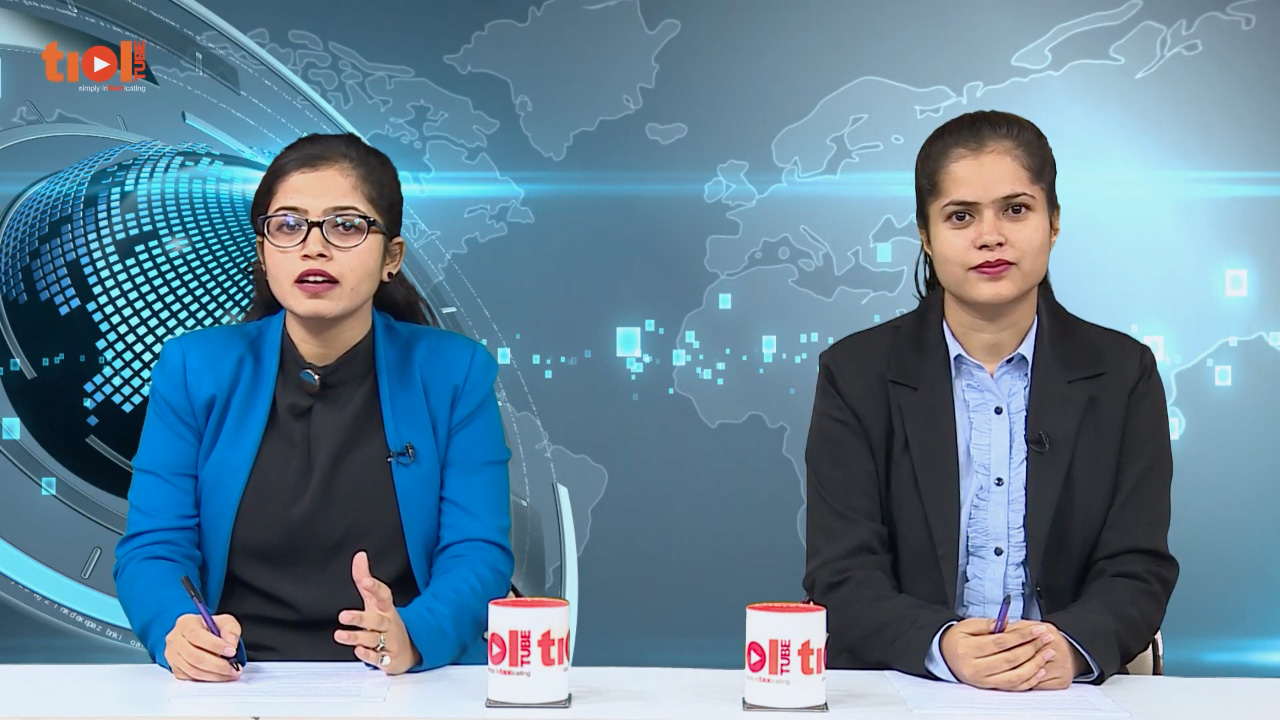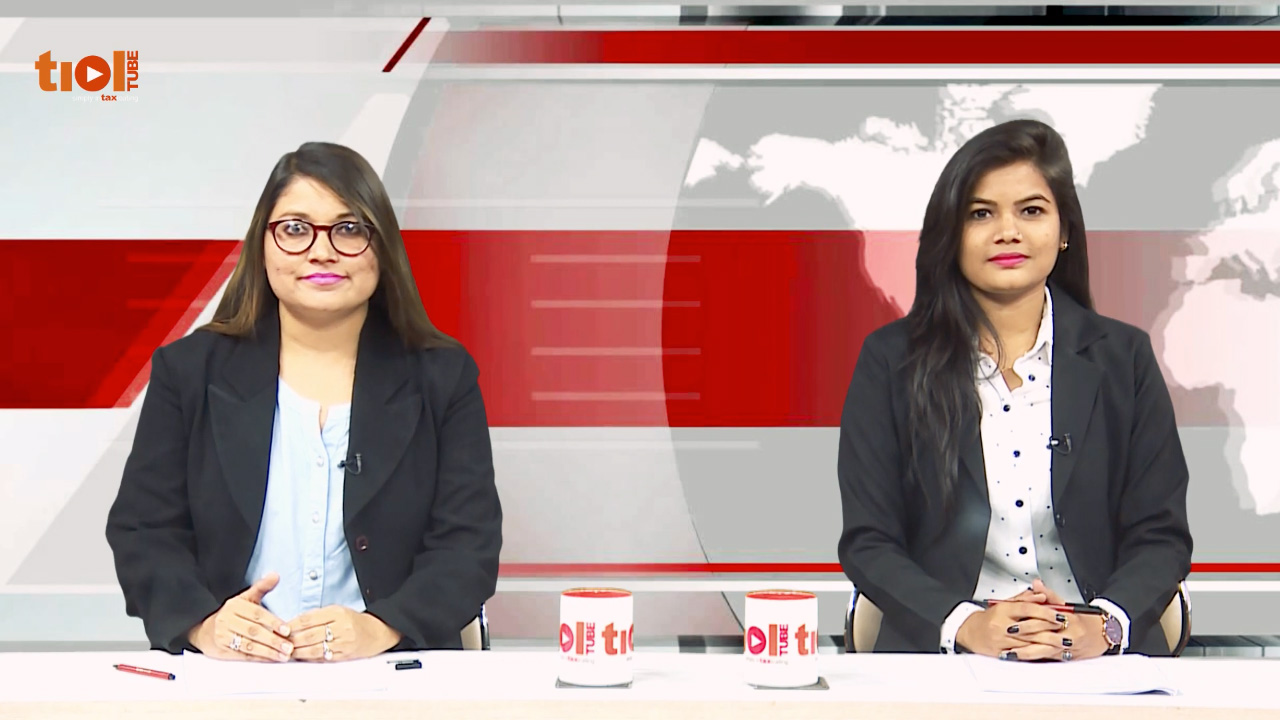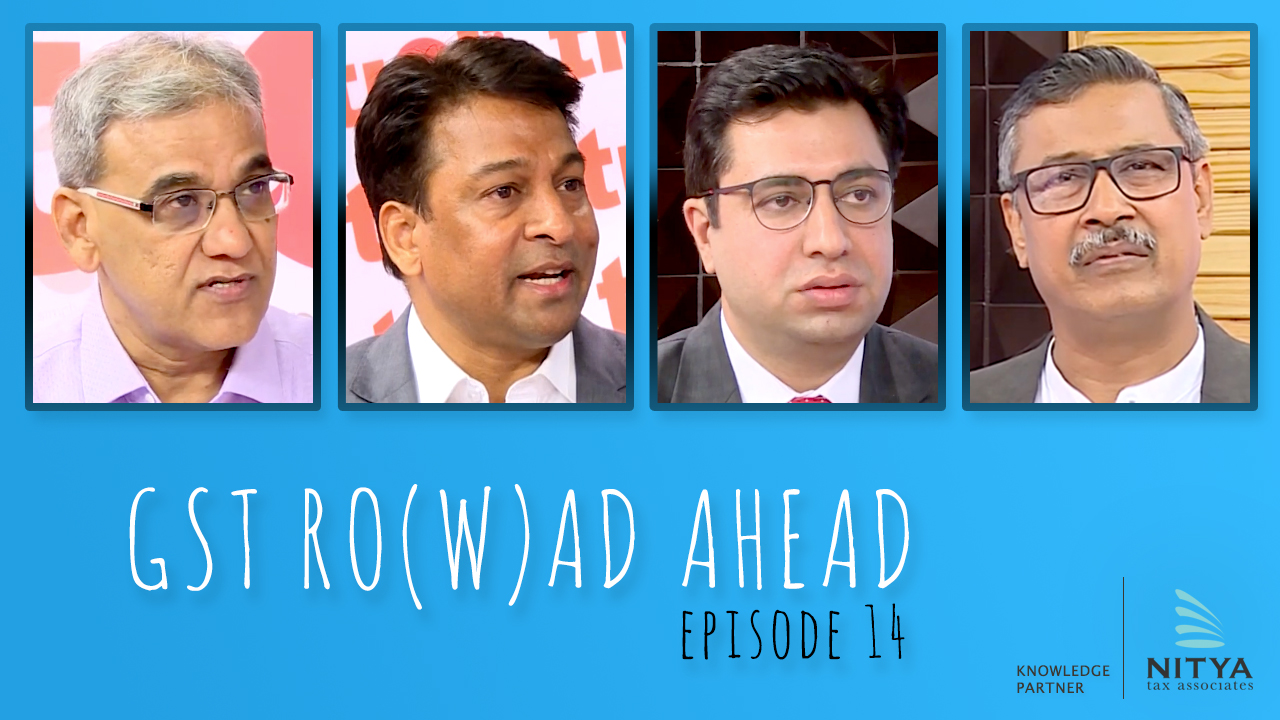| SERVICE TAX
2019-TIOL-2921-CESTAT-BANG
Royal Credit Services Vs CCE & CST
ST - The assessee is engaged in providing taxable services under category of "Business Auxiliary Service" i.e. recovery of cash and cheques from the personal loan customers of ICICI Bank - Investigation conducted by DGCEI against the assessee revealed that the assessee is not regular in discharging their service tax liability and accordingly the original authority confirmed the demand - Admittedly, the assessee has not discharged service tax liability from January 2013 to March 2014 and has agreed to pay the same along with interest - They paid the service tax liability for the period January 2013 to March 2014 as demanded in SCN but has not paid the interest - Further, assessee is not charging the service tax from ICICI Bank - He does not raise any bill on ICICI but get commission as per the agreement and service tax is not charged over and above the commission which means that the commission given by ICICI Bank is inclusive of service tax - Assessee has given the details of commission received from ICICI Bank on the basis of which Revenue quantified the demand - Since the assessee is not charging service tax separately and whatever commission is received, the Department has computed the service tax liability on the same which is to be considered as cum-duty and the assessee is entitled to benefit of cum-duty and the entire demand is to be recomputed by giving the benefit of cum-duty to the assessee - Since the benefit of cum-duty has not been given, therefore, matter is remanded to the original authority to pass a De novo order and quantify the demand of service tax after giving the benefit of cum-duty and excess amount if any paid will be adjusted against interest which the assessee is liable to pay for the delay in payment of service tax - Since the assessee was aware of his service tax liability because for the earlier period he has opted for VCES Scheme and paid the service tax, therefore, intentionally he did not pay the service tax and therefore he is not entitled to get the benefit under Section 80 - The amount of penalty will also be recomputed after giving the cum-duty benefit to the assessee: CESTAT
- Appeal allowed: BANGALORE CESTAT
2019-TIOL-2920-CESTAT-HYD
CCT Vs Sri Ram V Tolani
ST - The assessee is joint owner of certain properties, leased out for furtherance of business or commerce - Investigation into their transactions in respect of six properties revealed that they provided the taxable services 'Renting of Immovable Property'; that no tax was discharged nor periodical returns filed - A SCN was issued alleging, inter-alia, that each property leased out is registered under a single title deed; that the rental incomes are shared equally; that one of the assessee Shri Ramesh V Tolani has been vested with GPA by the others, to enter into the lease agreements in respect of the impugned properties; that the service tax including Cess is to be recovered with interest under proviso to Section 73(1) and Section 75 and penalties for the violations to be imposed under Section 77 and 78 ibid - After following due process, the original authority confirmed the tax demand along with interest under section 73(2) and 75 of FA, 1994 and imposed penalty under section 77 for contravention of various provisions and also imposed equal penalty under section 78 with an option to pay the reduced penalty within time frame specified - On appeal, the Commissioner (A) allowed the appeal of assessee - This issue is no more resintegra and has been settled in favour of assessee by various decisions relied upon by assessee - Further, in the case of Sarobjen Khusalchand & Others, Tribunal has relied upon the decision of Apex Court to conclude that the threshold exemption is available for each individual co-owner - Risks and rewards are not shared as each of the co-owner brought money from their own sources to buy properties and they are receiving rents separately - Further, the Commissioner (A) has rightly relied upon the decision in case of Sunita Rani Agarwal - In the case of Shiv Sagar Estates, Bombay High Court has held that lease rent from the property owned by co-owners accrues to individual co-owners and not to any association of persons - It has also been held that mere receipt of income jointly is not enough to consider that income is earned out of joint enterprise - There is no infirmity in impugned order which is upheld by dismissing all the appeals of Revenue: CESTAT
- Appeals dismissed: HYDERABAD CESTAT
2019-TIOL-2919-CESTAT-AHM
Nova Tech Engineers Vs CCE & ST
ST - The assessee is undertaking fabrication and machining of machinery parts / components on job work basis, out of raw material and with the infrastructure facilities provided in factories of M/s Larsen & Toubro Ltd and M/s Essar Ltd. - The materials are given by said entities, in terms of Rule 4 (5) (a) of CCR, 2004 - The adjudicating authority has held that the services fall under the category of 'Work Contract Service' and hence liable for service-tax - The adjudicating authority has not stated as to under which clause, the services of assessee fall - He has merely relied upon the Work Contract Service under CST Act, which cannot be applied under service tax since the statutory provisions of Service tax has exclusive definition of 'Works Contract' - The Supreme Court in case of Hotel & Restaurant Association - 2006-TIOL-195-SC-MISC held that the definition of a term in one statute cannot be used as a guide for construction of some term in another statute particularly in a case where the statutes have been enacted for different purposes - The same views were expressed by Tribunal in case of MMTC Ltd- 2015-TIOL-2708-CESTAT-BANG - Admittedly, assessee has received the goods under job work challan issued under Notfn 214/86-CE and Rule 4 (5) (a) of CCR, 2004 - The principal manufacturer has paid duty on clearance of their final product - When the goods were received under cover of challans issued under said Notfn 214/86 r/w Rule 4 (5)(a) of CCR, 2004, the same is not liable for service tax as the activity undertaken by assessee is exempted in terms of Notfn 8/2005 - ST - The demands are even time barred as the SCN was issued on 25.01.2012 for the period April 2008 to November 2011 - The issue involved is of interpretation of statutory provisions and cannot be considered as wilful suppression of facts with an intend to evade payment of service tax - Even otherwise, if any service tax was payable by assessee, the same was available to customers as cenvat credit and thus the whole issue becomes revenue neutral: CESTAT
- Appeal allowed: AHMEDABAD CESTAT
CENTRAL EXCISE
2019-TIOL-2368-HC-UKHAND-CX
Pegasus Farmaco India Pvt Ltd Vs UoI
CX - The petitioners had filed the petition questioning the validity of adjudication order passed by Commissioner, CGST, Dehradun - They sought exemption from depositing 7 ½ percent of the disputed duty, as required in terms of Section 35F of Central Excise Act - The writ petitioners would rely on a Division Bench judgment of Delhi High Court in Shubh Impex 2018-TIOL-968-HC-DEL-CUS - The decision of a High Court will have the force of a binding precedent only in the State or territories over which the Court has jurisdiction - In other States or outside the territorial jurisdiction of that High Court, it may, at best, have persuasive effect - Even otherwise, the decision of a Court is only an authority for what it actually decides - What is of the essence in a decision is its ratio, and not every observation found therein nor what logically follows from the various observations made in it - The aforesaid judgment of the Division Bench of the Delhi High Court, rendered on the facts and circumstances of the case before it, would not constitute a binding precedent, much less on another High Court - As it would be wholly inappropriate for the High Court, in the exercise of its extra-ordinary jurisdiction under Article 226 of the Constitution of India, to issue any directions contrary to the explicit provisions of Statutes, no reason seems to take a view different from what the Single Judge has taken - In this context, it must also be borne in mind that the scope of interference in an intra-Court appeal is extremely limited - Save cases where the order under appeal suffers from a patent illegality, no interference is justified - No such infirmity found in the order under appeal: HC
- Appeal dismissed : UTTARAKHAND HIGH COURT 2019-TIOL-2918-CESTAT-BANG Vectra Auto Components Pvt Ltd Vs CST
CX - The assessee is engaged in manufacture of body building in respect of chassis supplied by various manufacturers on job work basis - They are receiving duty paid chassis from various manufacturers including M/s. Tata Motors Ltd. - The transaction is on principal to principal basis - Assessee is availing cenvat credit of duty paid on chassis and is undertaking the body building activity on the said chassis - The body built vehicles are cleared to Regional Sales Offices (RSOs) of M/s. Tata Motors Ltd. on payment of duty by adopting the value as per Rule 6 of Central Excise (Valuation) Rules on the basis of principles laid down in case of Ujagar Prints - 2002-TIOL-03-SC-CX-CB and also the Circular 619/10/2002 - Department entertained the view that M/s. Tata Motors Ltd. has incurred freight charges for transportation of goods from their manufacturing unit to assessee's factory, allowed certain ineligible discounts and also paid automobile cess which are not included in assessable value for purpose of payment of duty by assessee as a job-worker - Further M/s. Tata Motors Ltd. has misdirected the invoice value by declaring it as transaction value - This vide its earlier order in case of M/s. Hyva India Ltd. - 2019-TIOL-1814-CESTAT-BANG on identical issue has allowed the appeal of assessee by setting aside the duties and also dropped the penalties imposed on Tata Motors - In view of said decision of Tribunal, the impugned order is set aside: CESTAT
- Appeals allowed: BANGALORE CESTAT
2019-TIOL-2917-CESTAT-MUM
Zenith Birla India Ltd Vs CCE
CX - The short question involved is whether the charges recovered from customer for the delayed payment by issuance of debit note to be added to the assessable value being in the nature of additional consideration while computing the assessable value of the goods sold - Revenue's contention is that the assessee had passed cash discount to the customers specifying the period within which if the payment is made by the customer, would be entitled to cash discount @ 3% - Both sides fairly agree and submit that the financial charges cannot form the part of the assessable value and also cash discount from the price is admissible in view of the ratio laid down by Supreme Court in case of Purolator India Ltd - 2015-TIOL-193-SC-CX - However, the objection of Revenue is that the assessee had collected extra amount by not passing the cash discount and in the guise of financial charges, hence, being an additional consideration, hence to be included in the value of the goods - Rebutting the said argument, assessee had referred to their price policy, disclosing there under the slab-wise cash discount admissible on the sale price slab-wise; also in the said policy, they disclosed interest for delayed payment depending upon the number of days delay, for which rate of interest also varies - The assessee referring to the example mentioned by Commissioner in impugned order, has submitted that the interest is recovered for delayed period and also they had recovered certain financial charges in addition to the interest for delayed payment by the customers - In this regard, he has referred to the letter dt.14.06.2002 addressed to the Superintendent - Therefore, it is their contention that the financial charges are recovered only when the delay exceeds more than 33 to 43 days - It is their contention that measures have been taken to discourage the late payment and also to compensate the financial cost incurred by assessee for not receiving the payment such charges are made - The amounts received are reflected in their balance sheet as financial charges only - It could be a coincidence that in certain cases the financial charges recovered from the customers may be equal to the cash discount, but reading their credit policy structure as a whole annexed to the appeal memo, it is clear that no recovery is made in excess of cash discount passed on as alleged by the Revenue other than recovery of the financial charges, for delay in payment more than the prescribed period - In these circumstances, no merit found in impugned orders, accordingly, the same are set aside: CESTAT
- Appeal allowed: MUMBAI CESTAT
CUSTOMS
2019-TIOL-2915-CESTAT-KOL
CC Vs Vaishno Maa Overseas
Cus - Revenue has filed Miscellaneous Applications for withdrawal of their appeals - Appeals are dismissed as withdrawn: CESTAT
- Appeals dismissed: KOLKATA CESTAT
2019-TIOL-2914-CESTAT-BANG
Vallabhdas And Company Vs CC
Cus - The assessee had imported Rock Phosphate from Egypt at Cochin port during June 2016 to November 2016 and cleared these under two Bills of Entry on payment of assessed duty including SAD at 4% - The goods were subsequently sold locally and thereafter the assessee filed claim for refund of SAD paid as provided under Notfn 102/2007 Cus. - Thereafter, a SCN was issued proposing to reject the refund claim on the ground that assessee had not paid any Sales Tax/VAT on the sale of imported goods - This issue is no more res integra and has been settled by various decisions of Tribunal including the decision in assessee's own case wherein the Tribunal vide its Final Order has allowed all the appeals by relying upon the earlier decisions of the Tribunal - Besides this, both the authorities have wrongly relied upon the decision of Apex Court which was in respect of Notfn 34/1998-Cus. - Said Notfn 34/1998 has been subsequently rescinded by Notfn 58/1998-Cus. - Therefore, reliance by both the parties on a Notification which has been rescinded is not tenable in law - Since the issue is squarely covered in favour of assessee in their own case, therefore by following the ratio of said decision, the impugned order is set aside: CESTAT
- Appeal allowed: BANGALORE CESTAT | 







